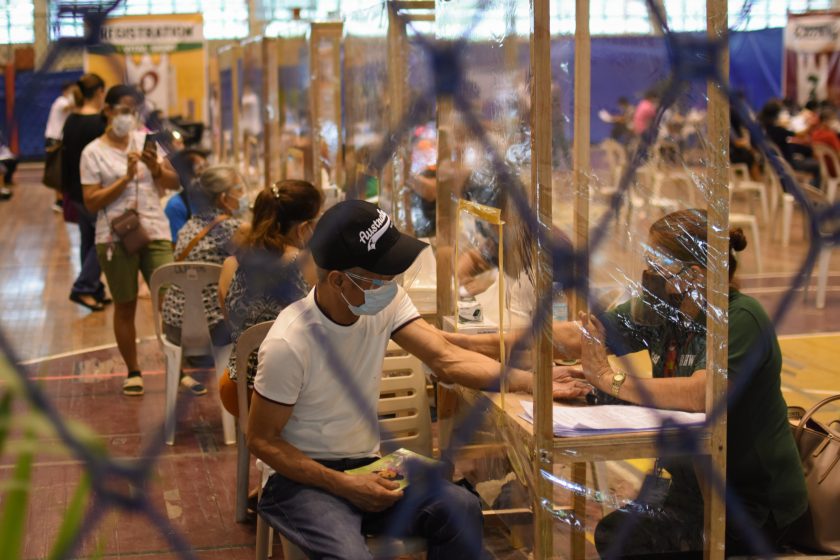By JANESS ANN J. ELLAO
Bulatlat.com
MANILA – A group of public health advocates warned that the reduced budget for the epidemiology and disease surveillance programs will “set a dangerous precedent for the fragmented health system” as it may impact the bulk of the pandemic response on the ground amid a more transmissible Delta variant of the COVID-19.
“The cuts in this essential branch of pandemic management will grossly impact epidemiology and surveillance units at the regional, city and local levels. Communities may see a decrease in response and assistance from the local health authorities if this slash pushes through,” said Joshua San Pedro, co-convenor of the Coalition for People’s Right to Health (CPRH).
In the proposed budget, the epidemiology and disease surveillance program is set to receive P113 million (US$2.26 million) in 2022. This is 33 percent lower than this year’s P158.6 million ($3.18 million) budget, and even way lower than the allocation set for this program before the pandemic.

If the mentioned figure was used as a baseline for succeeding allocations, it will appear that the proposed P113 million ($2.2 million) for 2022 is 25 percent lesser than the pre-pandemic budget of $3 million in 2016.
Further, the program’s funding has had a steady decline since 2019’s P263 million ($5.2 million), to the current P158.6 million ($3.1 million).
(Text and graphics by Dawn Cecilia Peña / Bulatlat)
The health department, during the budget hearings, said the epidemiology and disease surveillance only covers non-COVID services.
San Pedro, however, said that the Epidemiology and Surveillance Units (ESUs) of the central and local governments carry the bulk of the groundwork in the pandemic response. Among these include validating testing data, contact tracing, monitoring recoveries, and handling adverse events following immunization.
As it stands, the more transmissible Delta variant is now the dominant strain of the SARS-CoV 2 virus in the country. In recent days, it has been recording all-time highs in the number of new daily cases, with a seven-day average of 20,000 cases.
“As the leader of the lead agency for health, Secretary (Francisco) Duque must demand a higher budget for an overwhelmed bureau instead of merely surrendering to the prescriptions of the DBM [Department of Budget and Management]. He is in the position to ensure and fight for the right to health at the level of the community amid this public health crisis,” San Pedro said.
Contact tracing in PH
The Philippine government has yet to improve its contact tracing and mass testing amid the more transmissible and deadlier variant.
The CPRH said the daily positive rate reveals that the government is “not testing enough people and there are many in communities who do not know they are positive.”
The World Health Organization said as early as May 2020 that a positive rate of less than five percent is one indicator that the pandemic is under control, and help in understanding the spread because “where the positive rate is rising in a country, this can suggest the virus is actually spreading faster than the growth seen in confirmed cases.”
In the past two weeks, the government has only been able to test between 50,000 to 90,000 unique samples per the health department’s data drop, when their own target is supposedly up to 100,000 tests daily. This despite the ideal testing, to reach at least a positive rate of five percent, should already be between 200,000 to 400,000 a day.

The Philippines, which conducted a total of 1.1 million COVID-19 tests in the last two weeks, logged at least 299,773 positive cases. This equates to a 19.3 percent positivity rate, a far cry from the recommended percentage of the WHO.
At a time when lockdowns were imposed on the capital and surrounding regions, the health department should have invested in increasing its testing capacity to at least 5.9 million COVID-19 tests two week’s time, in order to adhere to the WHO’s policies.
(Text and graphics by Dawn Cecilia Peña / Bulatlat)
Health advocates meanwhile said RT-PCR tests are still mostly paid for out-of-pocket as free testing remains scarce.
Overall health budget, a dismal
Apart from the epidemiology and disease surveillance budget, the health department will receive what health advocates described as a dismal increase that is hardly enough to give life to the public health system as the country continues to struggle with the raging pandemic.
Under the proposed 2022 budget, the health department is set to receive P157 billion ($3.15 billion), a 17-percent increase from this year’s P134 billion ($2.69 billion) allocation.
“We are almost two years into the world’s longest lockdown and yet, the administration is still desperately failing to see where its priorities should lie,” San Pedro said.
The Health Alliance for Democracy (HEAD) also pointed out that hospitals and health workers in the country have been overwhelmed for some time now, including distress calls for the additional workforce, supplies of oxygen, medicines, and other needs for them to effectively combat the virus have been sounded repeatedly.
This year’s health budget increase – P23 billion ($461 million) – is a pittance compared to the special purpose fund in the proposed budget for the Office of the President, which progressive lawmakers have tagged as a “pork barrel.”
Earlier, Gabriela Women Party Rep. Arlene Brosas said the presidential pork is more than double the budget of the DOH for next year, adding that “there is no justification for this.”
Meanwhile, the budget for the National Task Force to End Local Communist Armed Conflict has increased from this year’s P19.1 billion ($382.88 million) to P30.46 billion ($610.6 billion) for 2022.
HEAD said, “people’s money must be used for the fight the Covid-19 virus. It should not be used to bolster Duterte’s fascist rule, enriching his cronies and stocking the election war chest.” (RVO) ![]()










0 Comments